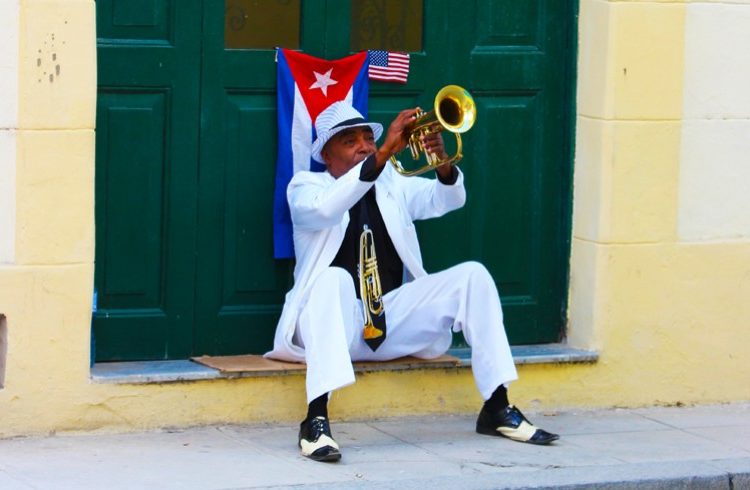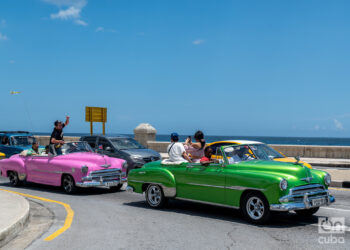The first year of the announcement of the reestablishment of diplomatic relations between the United States and Cuba has raised both significant challenges and opportunities for the bilateral link, with important achievements and advances.
On January 16th, 2015 the White House circulated exceptions to the embargo’s politics in terms of trips and trade with the emerging Cuban non-state sector.
Four days later, in his address to Congress, in front of the cameras of the nation, President Obama asked for an end to the embargo.
With the process of rapprochement, the U.S. managed to deactivate the diplomatic bomb that would have been a Summit of the Americas without Cuba.
The prophets of an Armageddon in Miami if the government followed this path of reconciliation have been proven wrong. The majority of the North American and Cuban-American population have defended the move.
Against a backdrop of the reduced economic clout of its Latin American partners (Brazil and Venezuela) thanks to the fall in prices of primary materials in the global market, Cuba experienced a 2015 of economic growth.
This is attributable, in part, to a 70% growth in U.S. journeys to Cuba. In addition, various Cuban negotiations with important international players such as the EU, Russia, China, Mexico and the Paris Club, have received the benefit of the improving relations with the number one global power.
Businesses in the EU and the rest of the world have expressed interest in the process of economic reform in Cuba and the important investment in the special development zone of Mariel.
If Cuba implements enough of the complementary reforms such as decentralisation and unification of the two currencies an improvement of the country’s international and economic position is to be hoped for.
The negotiations of two women, ambassadors Josefina Vidal and Roberta Jacobson, made important headway. What was an agreement negotiated in secret by the security sectors in both countries moved into the public, diplomatic arena, creating a window of normalcy and public debates in favour of the chosen course.
Each country has a corresponding embassy today, with their respective flags. The irritating incusing of Cuba in the State Department’s list of state sponsors of terrorism is over, culminating in transformation of the image of Cuba in official US discourse from a ‘threat’ to a ‘country in transformation’.
The negotiation processes have produced tangible results in areas such as the reopening of a direct postal service, coordinated responses to oil spills in the Gulf of Mexico, Coast Guard collaboration, the fight against drugs traffic, a bank account for the Cuban embassy, and a series of other areas in which progress continues.
Cuba and the U.S. are discussing human rights, sovereignty, democracy and legal claims. In the first meetings between the Heads of State in Panama, President Raul Castro said, supported by the US President, that there are areas in which concession is currently impossible, but that this may change in a new context.
All of this progress has taken place in a context that is not entirely favourable. On the U.S. side, the legal structure of the embargo/blockade and the North American programs aimed at regime change have remained.
The application of sanctions on U.S. entities and third-party countries linked to Cuba have resisted the administration’s announcements calling for a more liberal application of the licencing system.
Although President Obama praised the work of Cuban medics against Ebola in his address, the continuing reluctance to end the programme promoting the desertion of healthcare professionals from the Cuban missions has blocked further progress in a cooperation agreement between Havana and Washington.
On the Cuban side, in 2015 the reform programme has not gained further traction with new transformations.
The Cuban government has reacted with caution, taking advantage of the new situation in international negotiations but without responding with changes that could exacerbate the contradictions between the Obama administration’s proclaimed politics of détente and the legal structure of hostility inherited by the same administration.
Substantial demand for trips for Americans to Cuba, thanks to the new general licences, have encountered bottle necks and economic and institutional failures, delays and even indications of corruption that make it difficult to further develop the agreed cooperation.
Given that the situation could reverse if any of the republican U.S. presidential pre-candidates make it to the Oval Office, the excessive gradualism of some Cuban answers and U.S. moves to dismantle the embargo begin to acquire political dimensions.
Reaching a critical mass of collaboration between not only the two States but also the two societies and a core of individuals in favour of the rapprochement would be the best armour against any attempts to reverse the progress.
The key here is to take the pan out of the fire, making cooperation and exchange impermeable to any kind of crisis that may be provoked. An antecedent to this, and a measure of the increased confidence between the two counties, has been the dialogue about the high command of the Guantanamo naval base and the warrant officer at the border.
The current migratory crisis, with more than 3,000 Cubans stranded in Costa Rica is a test case, the resolving of which could send signals that Cuba and the U.S. can work together with countries on the isthmus to neutralize naysayers. The elimination of the promotion of desertions from Cuban medics would be a gesture of good faith from the U.S. towards Cuba and the Central American countries it affects.
The use of an inclusive discourse regarding common interests in the trips made by Kerry, Pritzker and Vilsack to Cuba are contributing to the development of a dynamic of mutual respect.
The culmination of this trend will be President Obama’s visit to Cuba before the end of his term in office. These visits are not only positive in terms of the ‘deliverables’, or contracts; they also produce intangible results such as a better understanding of the visions and problems of the constituent parts.
All argument about a lack of Cuban reciprocity in the face of Obama’s measures of January 16 is a distraction. In the asymmetric relationship, it is the stronger power that, with unilateral steps in the early phases of the détente, loosened the security restrictions and dismantled the punitive actions that exacerbated the image of vulnerability in the weaker country.
Today, it is recognised that a vital development for economic relations between Cuba and the US will be a general license from President Obama to use the U.S. dollar in these transactions. The White House can also license the use of private credit for the type of economic interactions that are already permitted.
The explosive importance of the Summit of the Americas in Panama for U.S.-Cuban rapprochement also highlights the importance of multilateral, triangular cooperation with other states from the region.
In this sense, Cuba should ask itself if its current exclusion from the whole inter-American system is optimal. Perhaps, rather that completely rejecting the idea of cooperation it should be viewed in terms of a menu – where Cuba can choose where to participate and where to refrain according to what might be most beneficial.
For example, a Cuban signature on the Inter-American Convention against terrorism, its incorporation into its organisational committee, the Pan-American Institute of Agriculture and the Commission against Drug Abuse could advance the agenda of détente in the sensitive areas of the bilateral link.
At the societal level a less haughty and more discursive dynamic is necessary in the conversations about the problems, virtues, and challenges of the other side.
The idea of a ‘reset’ that has been implicitly invoked by President Obama in his call to think of the future without obsession over history is not the best fit but the intention has a basis.
On December 17, 2014 the Presidents called for dialogue – listening, discussing, and cohabiting, in a different, less hostile manner. Without exaggerated optimism, nor irrational expectations regarding the resolution of suddenly resolving a conflict that has lasted decades, 2015 was a good start.










